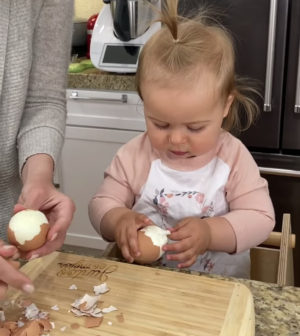- Six million light bulbs shine on Sagamiko Pleasure Forest this season
- Tokyo Christmas Market 2020
- Christmas market at the Ennichi Terrace is now open.
- Where to watch dancing sardines in Japan.
- Christmas lights go on display in Ginza
- Watch Snoopy movies at home during the Golden Week.
- The New York Food Film Festival 2020 has been cancelled amid coronavirus fears.
- McDonald’s Japan welcomes 2020 spring with new strawberry frappes
- All-you-can-eat strawberry desserts in 100 minutes.
- “Japan’s Cuisine, Nature, and Wisdom”- Exploring the Past and Future of Japanese Cuisine at the National Museum of Nature and Science
- The World of Shoen Uemura’s paintings of beautiful women
- Treasures from Budapest
- Strawberry and Chocolate Fair at Ikea Japan
- Your Guide to Tokyo’s Fun Ice Skating Rinks
- Yokohama lights up 500,000 leds this year.
- Future and the Arts: AI, Robotics, Cities, Life - How Humanity Will Live Tomorrow
“Cooking with children is Montessori,” says expert

As most families shelter in place amid the pandemic, there’s no better time to introduce kids to fun, real-life experiences than now.
The kitchen would be the ideal playground to do just that according to Audrey Zucchi, mother of 2, Montessori expert and author of the book “Grands apprentissages Montessori pour petits mains” (Montessori Learning For Little Hands).
In our society, meal preparation is a role assigned to parents or caregivers and mostly perceived by many as merely a ‘household chore’.
“Children eat whatever home-cooked meals are served to them at the table like kings and queens,” she says, “without getting them involved in the preparation”.
If this routine goes unchanged, Zucchi warns, “parents will be missing the opportunity of capturing their children’s curiosity and helping them cultivate a love of lifelong learning, teamwork and sensorial experience”.
The Montessori advocate cites the benefits of cooking with children.
Sensory Enrichment
Research shows that about 90% of a child’s brain develops by age 5. From birth to age five, a child’s brain develops more rapidly than at any other time in life.
Cooking with children as early as 18 months or younger helps support their cognitive development. Activities done by hand helps stimulate their brain development whether it is by touching food of different textures, or by the smell and taste of food and seasonings. Children will sometimes put some in the mouth and taste food which is completely normal. It is through this natural curiosity that they learn a new word - “salt” or “sugar” and assimilate these with the color white, grainy texture and salty or sweet flavor.
Manual Dexterity
When children are left to explore and given instructions as to how to mash a potato or stir a cake batter for example, we promote autonomy and help them use their hands in a skillful, coordinated way thereby strengthening their grip on a spoon or utensils with small precise movements.
Academic support
By simply instructing children to put a teaspoon of salt into a bowl or crack an egg, they learn new words and expand their vocabulary as they progress. Measuring ingredients introduces them to mathematics and saying the name of food and tools out loud allow them to learn how to form speech, words and sounds.
Concentration and Confidence
The best time to engage children into a cooking activity is when they have had a good nap. Preparing the environment by setting up a neat workspace with all the food and tools they will need to complete their task helps them to focus. Then clearly state the objective given to them while naming the tools. Show them how it’s done once slowly with precise gestures, and calmly. Give them precise instructions like “there should be no strip of skin left on the carrot ”. Then we let them do it on their own which will give them self-confidence for a job well done.
Sense of responsibility and hygiene
Cleaning up the work space during or after cooking teaches children the importance of responsibility and hygiene. While washing the dishes may be an adult thing, things like sorting utensils and putting them back in their assigned places are tasks even toddlers can do.
Her Tips:
1. Generally, we want to provide young children a bright working space in the kitchen with high chairs, kitchen utensils, rolling pins, a small whisk for them to be able to handle a given task.
2. Introducing a child to cooking early means making him feel involved in family life. As soon as he is old enough to walk and able to scoot around from 18 months, you can get him started. At this age, children can generally peel a hardboiled egg, cut a banana or knead a dough. It is at this age that children start developing important life skills, cut increasingly hard elements, until they progress to doing more complicated tasks. Assigning children from age 5 a task like melting chocolate bars or asking a 6-year old kid to cook a risotto is absolutely doable.
3. To engage children’s attention, it is important to only give tasks suited to their personality or needs. Where a hyperactive child may find kneading a dough more fun, arranging apple slices on a tart may be more suitable for a visual learner.
For good recipes you can do with your children at home, look to FlavCity videos posted daily by Bobby Parish, a rising social media rock star and dad who cooks with his adorable daughter.
photo and video by Flav City


